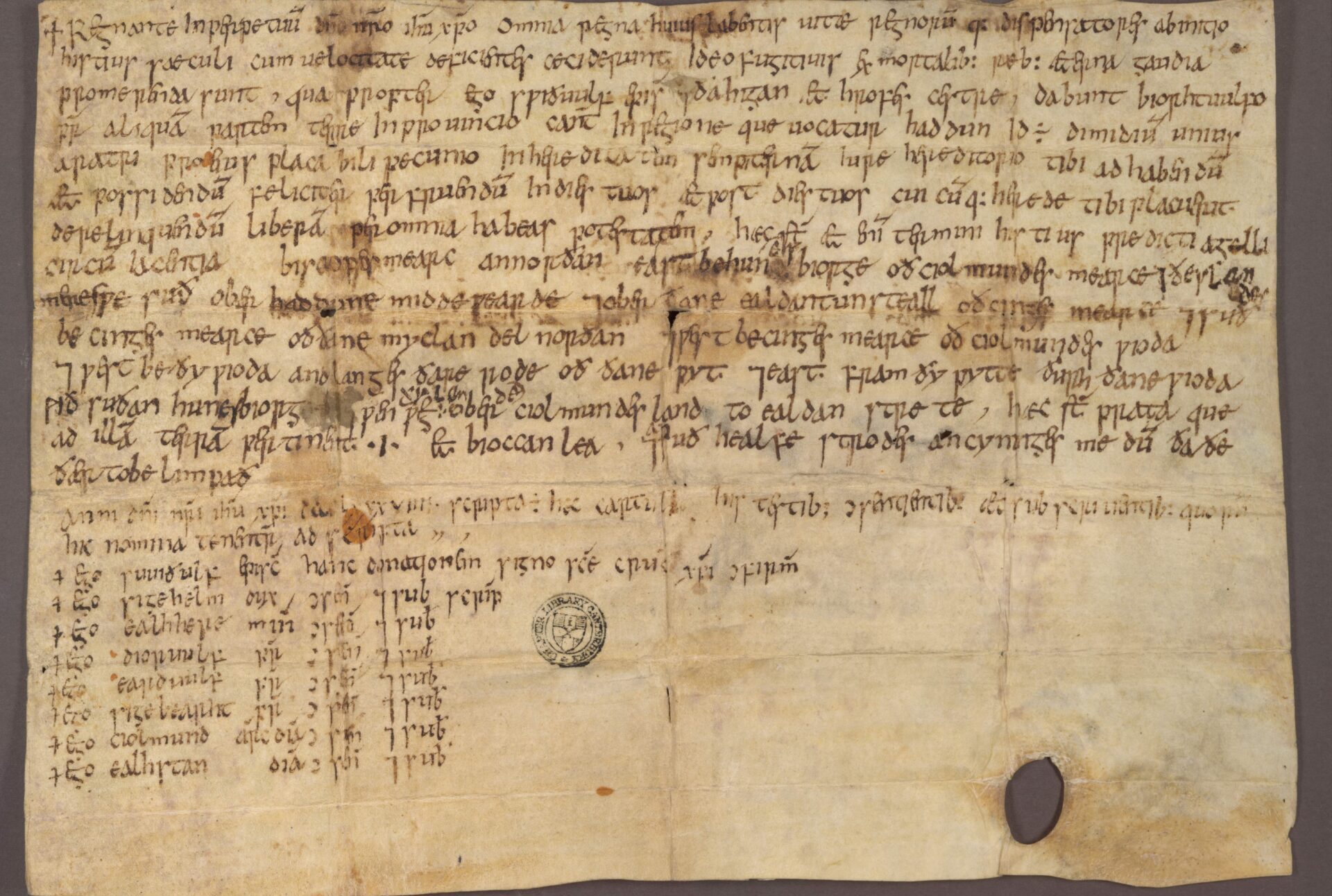
The Materiality of Early Medieval English Charters
Supervisory Team: Dr Robert Gallagher (Kent), Prof Julia Crick (King’s)
Based at: Kent
KOM Theme: A – Technologies of Knowledge
Scholars have long recognised the value of charters for understanding literacies and the role of the written word in early medieval societies (e.g. Lowe, 1998; Tinti, 2021). Nevertheless, the single-sheet charters from early medieval England remain a corpus subject to limited material analysis. Important questions regarding the visual aspects of these documents remain under-explored in regards to, for instance, typologies and intended modes of audience engagement. Why are some charters in landscape and others in portrait form? To what extent was script choice dictated solely by language choice? And what factors influenced punctuation practices? Such questions invite comparison with recent work in Medieval Studies on graphic communication (Garipzanov, 2018), literacies (McKitterick, 2021) and performance (Insley, 2011; Roach, 2011; Koziol, 2012; Mersiowsky, 2015). They will, in turn, reaffirm the importance of charters for understanding the nature of early medieval literary cultures.
Applicants for this project are expected to have a working knowledge of Latin, paleography and codicology, as well as a strong understanding of relevant historical contexts. Prior knowledge of Old English and Anglo-Saxon diplomatic is also desirable.
Bibliography of works cited
Garipzanov 2018 = Ildar Garipzanov, Graphic Signs of Authority in Late Antiquity and the Early Middle Ages, 300-900 (Oxford, 2018)
Insley 2011 = Charles Insley, ‘Rhetoric and Ritual in Late Anglo-Saxon Charters’. In M. Mostert, & P. Barnwell (Eds.), Medieval Legal Process: Physical, Spoken and Written Performance in the Middle Ages (Leiden, 2011), pp. 109-121
Koziol 2012 = Geoffrey Koziol, The Politics of Memory and Identity in Carolingian Royal Diplomas: The West Frankish Kingdom (840-987) (Turnhout, 2012)
Lowe 1998 = Kathryn A. Lowe, ‘Lay Literacy in Anglo-Saxon England and the Development of the Chirograph’ in Phillip Pulsiano and Elaine M. Treharne ed., Anglo-Saxon Manuscripts and their Heritage (London, 1998)
McKitterick 2021 = in Rosamond McKitterick, ‘Charters, Languages, and Communication: Recent Work on Early Medieval Literacy’ in Robert Gallagher, Edward Roberts and Francesca Tinti ed., The Languages of Early Medieval Charters (Leiden, 2021), pp. 22-67
Mersiowsky 2015 = Mark Mersiowsky, Die Urkunde in der Karolingerzeit. Originale, Urkundenpraxis und politische Kommunikation, 2 vols. (Wiesbaden, 2015)
Roach 2011 = Levi Roach, ‘Public rites and public wrongs: ritual aspects of diplomas in tenth- and eleventh-century England’, Early Medieval Europe, xix (2011), 182-203
Tinti 2021 = Francesca Tinti, ‘Latin and Germanic Vernaculars in Early Medieval Documentary Cultures: Towards a Multidisciplinary Comparative Approach’ in Robert Gallagher, Edward Roberts and Francesca Tinti ed., The Languages of Early Medieval Charters (Leiden, 2021), pp. 1-21
Image reproduced with kind permission of the Dean and Chapter of Canterbury Cathedral